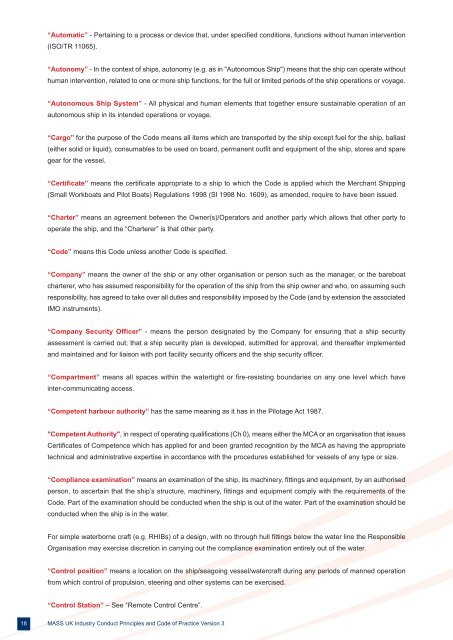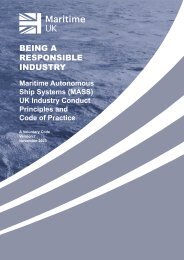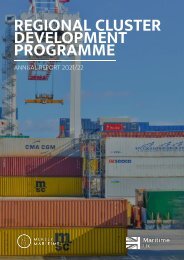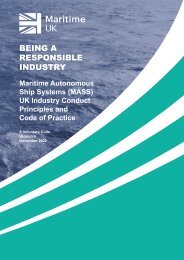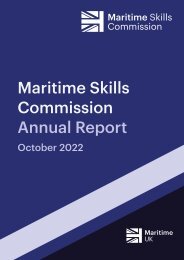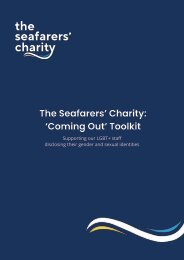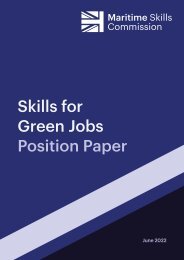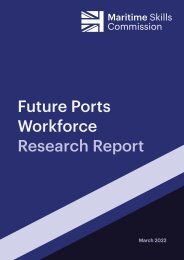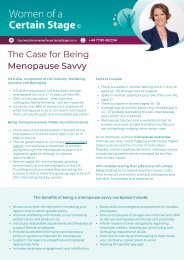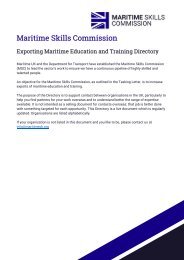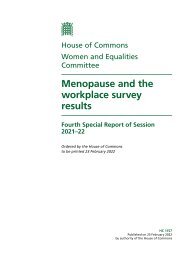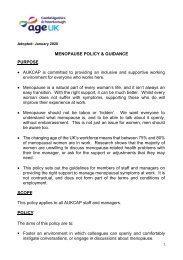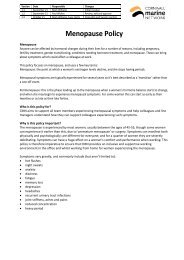code_of_practice_V3_2019
Create successful ePaper yourself
Turn your PDF publications into a flip-book with our unique Google optimized e-Paper software.
“Automatic” - Pertaining to a process or device that, under specified conditions, functions without human intervention<br />
(ISO/TR 11065).<br />
“Autonomy” - In the context <strong>of</strong> ships, autonomy (e.g. as in "Autonomous Ship") means that the ship can operate without<br />
human intervention, related to one or more ship functions, for the full or limited periods <strong>of</strong> the ship operations or voyage.<br />
“Autonomous Ship System” - All physical and human elements that together ensure sustainable operation <strong>of</strong> an<br />
autonomous ship in its intended operations or voyage.<br />
“Cargo” for the purpose <strong>of</strong> the Code means all items which are transported by the ship except fuel for the ship, ballast<br />
(either solid or liquid), consumables to be used on board, permanent outfit and equipment <strong>of</strong> the ship, stores and spare<br />
gear for the vessel.<br />
“Certificate” means the certificate appropriate to a ship to which the Code is applied which the Merchant Shipping<br />
(Small Workboats and Pilot Boats) Regulations 1998 (SI 1998 No. 1609), as amended, require to have been issued.<br />
“Charter” means an agreement between the Owner(s)/Operators and another party which allows that other party to<br />
operate the ship, and the “Charterer” is that other party.<br />
“Code” means this Code unless another Code is specified.<br />
“Company” means the owner <strong>of</strong> the ship or any other organisation or person such as the manager, or the bareboat<br />
charterer, who has assumed responsibility for the operation <strong>of</strong> the ship from the ship owner and who, on assuming such<br />
responsibility, has agreed to take over all duties and responsibility imposed by the Code (and by extension the associated<br />
IMO instruments).<br />
“Company Security Officer” - means the person designated by the Company for ensuring that a ship security<br />
assessment is carried out; that a ship security plan is developed, submitted for approval, and thereafter implemented<br />
and maintained and for liaison with port facility security <strong>of</strong>ficers and the ship security <strong>of</strong>ficer.<br />
“Compartment” means all spaces within the watertight or fire-resisting boundaries on any one level which have<br />
inter-communicating access.<br />
“Competent harbour authority” has the same meaning as it has in the Pilotage Act 1987.<br />
"Competent Authority", in respect <strong>of</strong> operating qualifications (Ch 0), means either the MCA or an organisation that issues<br />
Certificates <strong>of</strong> Competence which has applied for and been granted recognition by the MCA as having the appropriate<br />
technical and administrative expertise in accordance with the procedures established for vessels <strong>of</strong> any type or size.<br />
“Compliance examination” means an examination <strong>of</strong> the ship, its machinery, fittings and equipment, by an authorised<br />
person, to ascertain that the ship’s structure, machinery, fittings and equipment comply with the requirements <strong>of</strong> the<br />
Code. Part <strong>of</strong> the examination should be conducted when the ship is out <strong>of</strong> the water. Part <strong>of</strong> the examination should be<br />
conducted when the ship is in the water.<br />
For simple waterborne craft (e.g. RHIBs) <strong>of</strong> a design, with no through hull fittings below the water line the Responsible<br />
Organisation may exercise discretion in carrying out the compliance examination entirely out <strong>of</strong> the water.<br />
“Control position” means a location on the ship/seagoing vessel/watercraft during any periods <strong>of</strong> manned operation<br />
from which control <strong>of</strong> propulsion, steering and other systems can be exercised.<br />
“Control Station” – See “Remote Control Centre”.<br />
18<br />
MASS UK Industry Conduct Principles and Code <strong>of</strong> Practice Version 3


